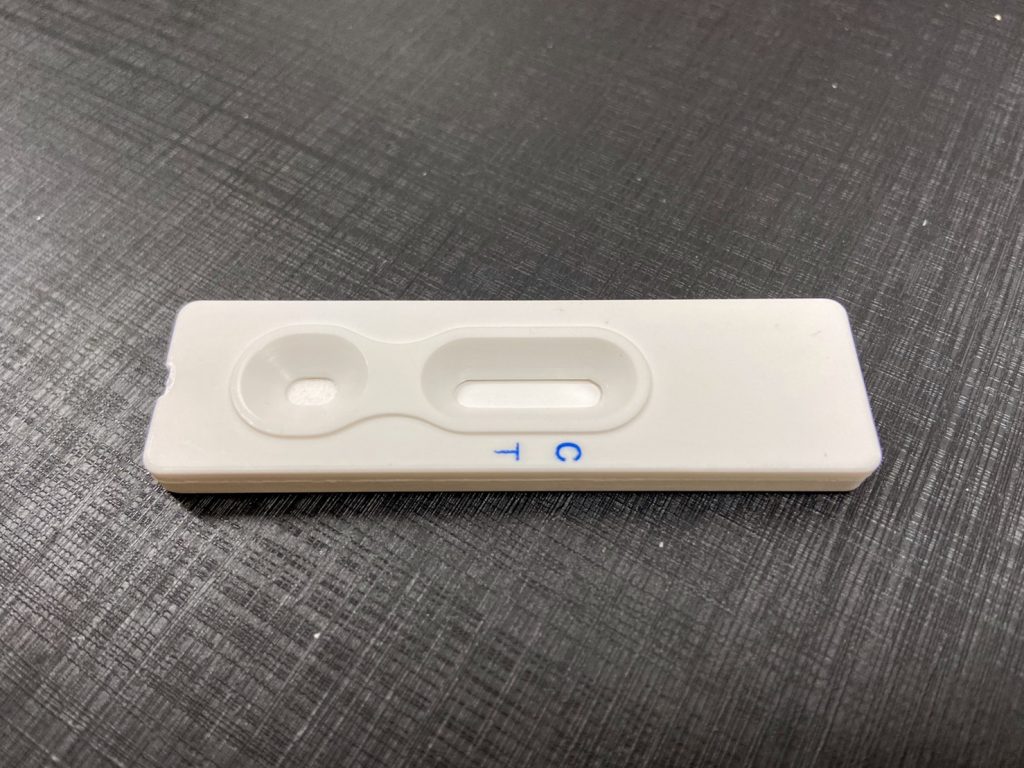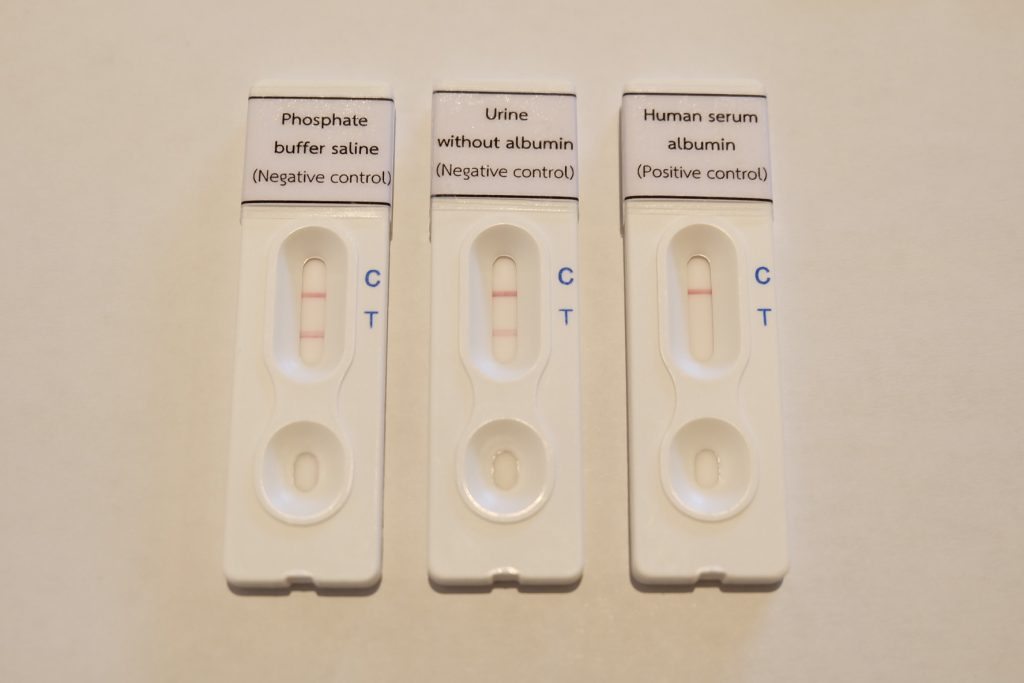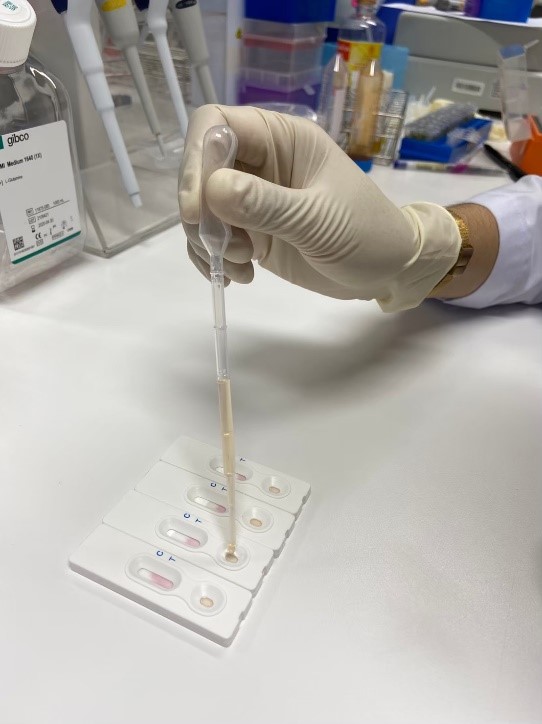Chula Pharmaceutical Science helps increase public confidence to keep COVID-19 at bay with their new test kit to verify the safety and efficacy of hand sanitizers and alcohol-based gel and spray products.
Since the onset of the COVID-19 pandemic, many are now accustomed with the New Normal lifestyle in which require social distancing, frequent hand washing, and sanitizing with hand sanitizer and alcohol sprays to clean their hands and belongings. But how can we be sure that the products we use are safe for our health and effective in cleaning and disinfecting?
Asst. Prof. Dr. Supakarn Chamni, Department of Pharmacognosy and Pharmaceutical Botany, Faculty of Pharmaceutical Science, Chulalongkorn University, explained the problems of hand-sanitizing gel and spray products as appeared in the media and reported from the Smart Buy Testing Center, The Foundation for Consumers.
“Sixty-seven percent of the products surveyed have alcohol concentration lower than 70% by volume, which is not adequate for killing germs. Moreover, these products were found to be contaminated with harmful chemicals that could irritate the respiratory tract, and if it gets into the eyes, can cause blindness.”
Based on such concerns, Asst. Prof. Dr. Supakarn has developed the Q-E-S-T 3-in-1 Alcohol Test Kit to enable the public to check the standards and safety of alcohol and sanitizing products by themselves.
“This test can analyze both the type and concentration of alcohol to confirm the effectiveness of its cleaning and disinfection property to reduce the risk of spreading the COVID-19 virus.”
Get to Know the different types of alcohol
Alcohol has antimicrobial properties against viruses, bacteria, and fungi, by killing or stopping the growth of the microbes and can therefore be used to clean and disinfect the skin and various surfaces.
There are different types of alcohol depending on their chemical structures:
Ethanol and isopropanol are the alcohol types used for human consumption. Ethanol is the alcohol found in liquor. It can be used both externally and orally. It costs the highest compared to other types of alcohol. Isopropanol is for external use only, such as for cleaning wounds.
Methanol is an alcohol used in the fuel industry. It is a solvent in the paint industry and a precursor in the plastics industry.
All three types of alcohol have similar characteristics. They are all clear, colorless liquid that evaporate easily and is flammable. The only difference is the smell.
“Isopropanol used to clean wounds has a pungent smell, while ethanol and methanol have a mild scent. Therefore, it is difficult to distinguish them olfactorily,” Asst. Prof. Dr. Supakarn warned about the potential danger should unscrupulous manufacturers mix methanol in with hand sanitizing alcohol.
Methanol poisoning and symptoms
Methanol is highly toxic to humans, and should not be inhaled, let it come in contact with the skin, or, under no circumstances, ingested. Those working with methanol need to wear masks and gloves for protection.
Exposure to more than 40 mg/kg of methanol or inhalation of more than 200 ppm per day can lead to nausea, vomiting, respiratory problems, bronchitis, and even blindness, and death.
Asst. Prof. Dr. Supakarn cited incidents in foreign countries as a warning of the dangers of methanol. “In 2020, there was a reported 1,000 deaths from methanol-contaminated alcohol in countries such as Iran, Russia, and Mexico, and data from the US Centers for Disease Control and Prevention (US CDC) showed 15 people in Arizona and New Mexico accidentally ingested alcohol-based hand sanitizer – four were dead, and three went blind.”
Basic alcohol test you can do yourself
“Alcohol-based hand sanitizers have become essential items to prevent the spread of COVID-19. Therefore, consumers must be able to check the efficacy and safety of the products themselves,” Asst. Prof. Dr. Supakarn said.
“The Q-E-S-T 3-in-1 Alcohol Test Kit can test both pure alcohol and alcohol-based gel and liquid products, or even products with added colors and scents. The chemicals used for testing are safe, and have been certified by the National Institute of Metrology (Thailand).”
The test kit can detect all three types of alcohol: ethanol, isopropanol, or methanol, and can specify the ethanol concentration in the range of 30-90 percent (±10 percent) by volume (v/v) within three to five minutes.
“The test is simple to use. Measure one ml. of the alcohol sample into the provided container. Then add five drops of the first solution which is an alkaline solution, and add one drop of the second solution that is green. Close the cap, shake well, and observe the color change at the three-minute mark to interpret the result according to the color chart,” Asst. Prof. Dr. Supakarn explained.
Ethanol is displayed in orange, but if the result is yellow, it means that it is methanol. Isopropanol is displayed in gradients.
For ethanol concentration analysis, read the result at the 3-minutes mark. If 80% v/v ethanol is present, an orange precipitate will form. With 70% v/v ethanol, the solution will become orange, and if there is less than 70% ethanol v/v, the solution will be brown, or greenish-brown.
“Quality alcohol can kill germs. The test result should be orange,” Asst. Prof. Dr. Supakarn reminded us.
How to store alcohol over a long period
Alcohol is a volatile substance at room temperature, so, care should be taken when storing and choosing the right container.
“Putting alcohol in a wide-mouth pump bottle will allow the alcohol to evaporate more easily than a spray bottle. Alcohol should be stored in a container with a tight lid. Do not leave the lid open or leave it in the sun for a long time. Once opened, or repacked into other containers, the expiration date changes.”
The duration of use depends on the environment. Asst. Prof. Dr. Supakarn suggested that “if you put (the alcohol) in a bag and stay in an air-conditioned office, it will last about six months. If it is placed outside the building, it will last three months. Do not put alcohol in the car, because alcohol can evaporate, and permeate the cabin, and could spark if exposed to a lighter or a charging port. This can be dangerous.”
Use alcohol safely, and stay away from diseases
Asst. Prof. Dr. Supakarn reiterated the guidelines for safe use of alcohol that “every time after touching public objects, you should sanitize your hands with hand sanitizers with 70% v/v ethanol by rubbing the sanitizer evenly over all areas of the fingers, palms, and wrists for at least 30 seconds.”
“If you touch the alcohol, and it’s no longer cold to the touch, or if the alcohol has abnormal characteristics such as stratification, coagulation, sedimentation, or discoloration, don’t use it.”
Finally, Asst. Prof. Dr. Supakarn advised consumers to purchase alcohol sanitizing gel and spray from reputable sources, with a label indicating the registered number, and expiration date. And if you are not sure of the product’s efficacy, you can also check it with the Q-E-S-T 3-in-1 Alcohol Test Kit.
“If the tested product has ethanol alcohol content of less than 70%, or methanol is found, you can send the tested sample for confirmation to the Bureau of Cosmetics and Hazardous Substances, Department of Medical Sciences, Ministry of Public Health,” Asst. Prof. Dr. Supakarn said.
Q-E-S-T 3-in-1 Alcohol Test Kit is available at Osotsala, Faculty of Pharmacy, Chulalongkorn University, Tel. 0-2218-8428-9. (A test kit is priced at 200 baht containing 10 tests).








.jpg)
.jpg)







